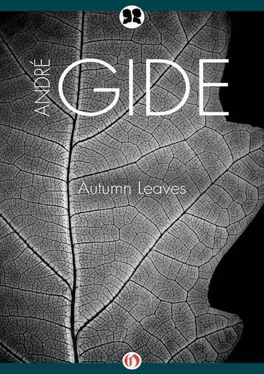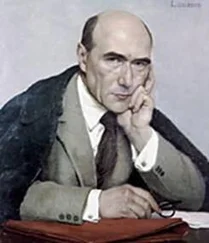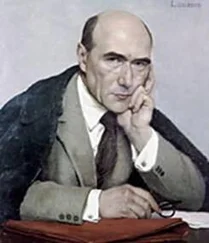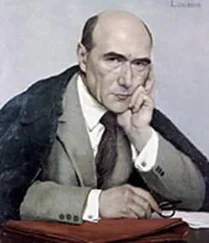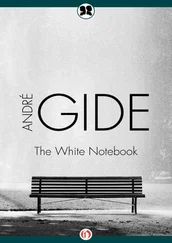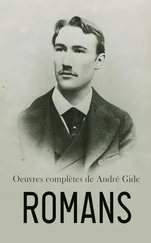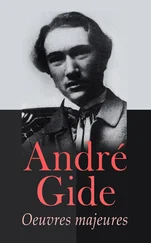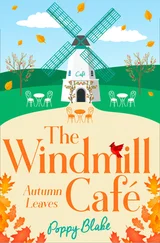It is not even at sunset, but two hours after, that he awakes. He stretches himself. He nibbles me a little, as though to assure me again of his presence. He comes out of his hiding place, sniffs the air less burning, weighted with perfume and moisture. How good it is! It is the time when the pupils of his eyes that do not close at night, become enlarged, when the sky gives back to the earth a little of the humidity it has taken from it, when the forest begins to live. For Dindiki, it is the time to come down from his roost. I imagine him descending from the top of his tree, reaching the spring where he quenches his thirst. I imagine a family of dindikis, father, mother and little ones, all in single file as is the custom of the country, that custom followed by the giraffes, antelopes and the natives, and that we adopt over there, for there is nothing to do but submit to the customs whose reason is hidden from us. I see them with that little brisk, joking air they know how to assume and that amused me so much; I see them passing from one tree to another, from branch to branch, or making the creepers bend under their light weight. The father guides them toward the cavity the bees have filled with honey. At this time the bees are asleep; and if they happen to stir, the dindikis roll themselves into a ball; the sting is not as long as their hair. They play jokes; they gloat.…
Alas! it is the time when I must shut up Dindiki; for it is the time when he emancipates himself; he escapes me; he would like to run after adventure; and it would be to find what? We left the forest a long time ago; the country we are crossing is only a gloomy savannah, where famine cries aloud, where one looks in vain for shelter. Would he really like to leave me? Perhaps not; but only run a little. When I let him wander about in my whaler, if we are navigating on the Logone or the Chari, he never fails to return to me; makes unbelievable efforts to join me. When, worn out, I isolate him in the boys’ whaler, he passes from one to the other, over the cable that ties them together. He makes the ascension of my armchair, from behind, slyly and, as a joke, from the top of the back, he pulls my hair or my ear; that means: “Play with me.” Or hanging by one foot on the shimbeck, his body stretched out unbelievably, with his forepaw he reaches my skull and scratches it a minute, then runs away. But the most fun (for him at any rate, for I would like to sleep) is, as soon as he sees me lying down, to do acrobatic stunts on the top of my mosquito net, turn somersaults, curl up, and what not! How gay he is! Then he goes round and round the closed net, with which he gets very impatient; he tries to slip under it; he succeeds. All that is charming; but when, after a long day of walking, I would like to get a little momentum from sleep for to-morrow’s walk, I shut Dindiki in a basket or in one of the sleeping bags; from which, in the morning, he comes out briskly, and, once delivered, pitter-patters toward me without resentment.
In the early days, I intended, by keeping him awake during the day, to triumph over his habits, to induce him to sleep at night. He didn’t understand. That almost caused a break between us. Besides, he just didn’t sleep all day long, only he was quiet. When I walked or went horseback, he seemed to take great pleasure in seeing the road unroll, in seeing himself taken from place to place without effort. He was afraid of nothing. When I took him hunting, the noise of gunshots, so close to him, didn’t even make him tremble.
He was one of the easiest to feed, ate great quantities of bread, and as willingly rice or cassava. Condensed milk, cooked creams, preserves, were his favorite food; but all constipating foods, with the result that I did not dare give in too much to his tastes. On a certain evening when we were at table with him, our lamps attracted a swarm of winged termites that all at once drove him crazy. He threw himself on them with a sort of rage; and to see him eat them that way (the natives eat them too) gave me the idea of offering him other insects. He crunched them all, almost indifferently at first; but the black beetles disgusted him; shaking his head violently, he spit out all he could with a great abundance of saliva; and, after that, we stuck to tiger beetles.
However, in spite of all my care, I never succeeded in giving him food that was not over-heating; for he refused almost all fruits; and even those he accepted, banana or papaya, he touched only with the ends of his teeth; so that, from time to time, I had to resort to injections.
Constipation was not the only thing from which he was to suffer. The heat tried him very much. It must be said that, in the damp equatorial forest where he lived, the temperature rarely rises above 35 degrees 1. Between Pouss and Maroua, in the north of the Cameroons, we were crossing a region without shade. Everything was dry, burnt up, consumed. Each day, we started on our way long before dawn to avoid the most torrid hours. At Gingleï, which we reached the 21st of March, after six hours of walking, the thermometer registered 45 degrees 1at the coolest spot in the passenger compartment, a round hut, with a roof of thatch, or palms, or reeds, supported by a bundle of branches. Both Marc and I, prostrate in our steamer-chairs, panted for breath. Contrary to his habit, Dindiki tried to escape me. Tired of holding on to him, of running after him, of getting him back, I ended by letting him alone. He reached the nearest beam, then the branches of the roof, then, going higher and higher, almost disappeared in the dusty tangle of twigs. Evidently the little animal hoped, by going up, to find a little coolness, as, in his native forest, at the breezy tops of high trees. But his instinct deceived him here; under the oven-heated roof, in the depths of that funnel without exit, it was hell. And stupidly (I was exhausted) I told myself: “If he’s too hot, he’ll come down.” Dindiki didn’t come down. On the contrary, at two different times, I saw him force himself further into that gehenna. Still I add, to my credit, and so as not to be judged too much of an idiot, that Dindiki, ordinarily, did not seem to suffer much from a lack of air. It often happened that he buried himself under cushions and blankets, that he slipped way down into my bed, “to the extreme limit of suffocation,” Madrus would have said; as, if to sleep well, the non spirare should be added to the non vedere and the non sentire; in this way life is suspended by certain fakirs and hibernating animals. And this habit of the pérodictique permits me to believe that he must make his nest in the cavities of old trees, or perhaps he enters to hide during the day, in the manner of our dormice and lerots.… I return to Gingleï. We had still a rather long trek to complete before evening. When the moment came to start again, I asked Outhman, one of our two boys, to go find Dindiki for me. He brought down from the top of the roof a little soft, inert mass with sightless eyes and a heart that was scarcely beating any more.
I would not admit that Dindiki was dead. I laid him on my lap, breathed on him, rubbed him, and while Outhman fanned him, gave him, with Marc’s aid, the artificial respiration with which one resuscitates the drowned. Marc had the idea of an injection of caffeine. Adoum, our other boy, ran after the porters, going along up ahead with the canteens, and brought back our pharmacy chest. At the end of an hour of treatment, his heart began to beat again. He vomited, which seemed a good sign to us and appeared to mark the refunctioning of his organs. Death had at last released its grip.
Dindiki took a long time to recover. The heat continued to be overpowering. Around his coop I put a damp cloth over which a big sponge slowly dripped water. For six days he refused any other food or drink except the saliva he came to gather from my lip, like Lesbia’s sparrow. He showed himself extraordinarily eager for it, by appetite, greediness … or tenderness; for since his asphyxia, he had become still more affectionate, as if he understood I had snatched him from death. Alas! I did not succeed in fighting effectively against the constipation that finally took him away from me two months later. Those periods of stoppage were followed by collapses that forced me to exile him for a time in a basket. He came out of it terribly embarrassed, for there was no-one cleaner or more careful of his person than that little being. Certainly something was lacking in his diet, grass, bark, that I could not get for him. I even persuaded myself that in the latter days, it was to hunt for it, that he was so anxious to run about. He seemed to say to me: “Why no! I don’t want to escape. Only let me find that. I will come back.” That, what was it? I thought I had found it when I saw him throw himself greedily on a tree gum Outhman had brought me. But only the next day, he didn’t want any more. He showed himself more and more difficult, as if he had understood that the food I was offering him, and with which he was satisfied at first, was not exactly what suited him. I saw him with anxiety and despair refuse, turn about, bread, rice and semolina. When I was going across the brush, he hung himself from one of my fingers, by a paw, and stayed head down, brushing against the grass; and I walked very slowly, lingering in the hope of seeing him snatch at a blade suddenly. Nevertheless, up to the next to the last day, he stayed in a charming mood, as affectionate as ever. He begged for my caress, raising his little arms up very high to invite me to scratch his armpit; and he even crossed his two hands above his head with the gesture of a ballerina.… Then, suddenly he began to hate me; two different times, he bit me cruelly; without reasoning exactly, he persuaded himself, I am sure, that I was what prevented him from taking care of himself in his own way, what had taken him away, what had kept him far from his blessed forest. He understood that I could not cure him.
Читать дальше
